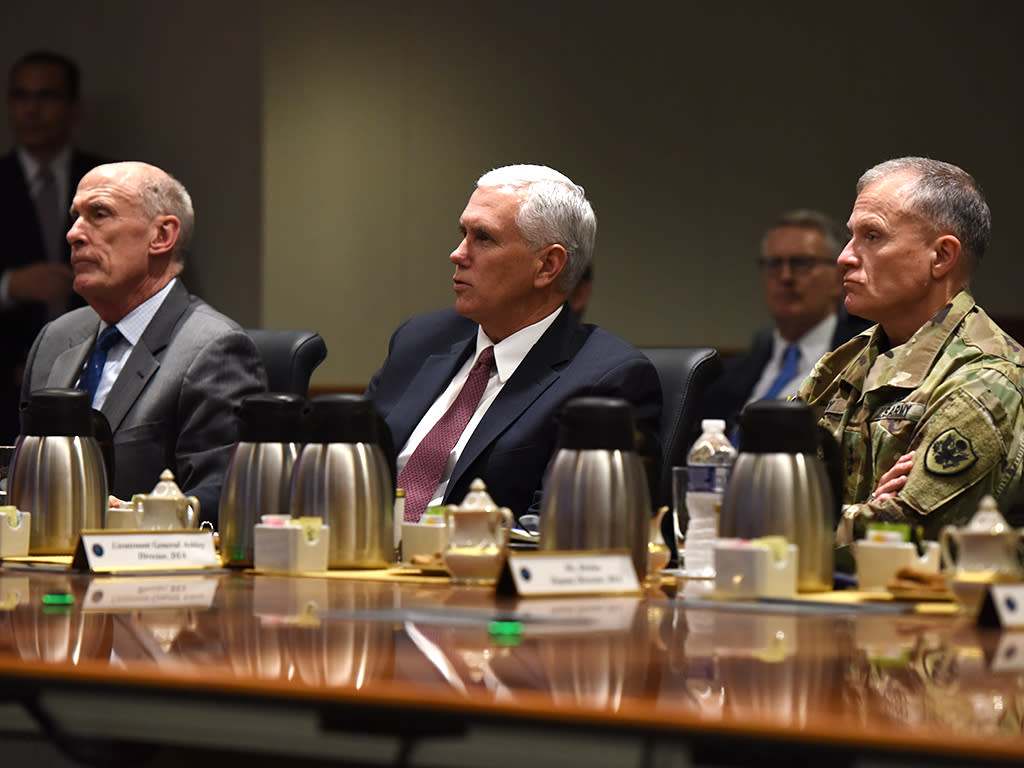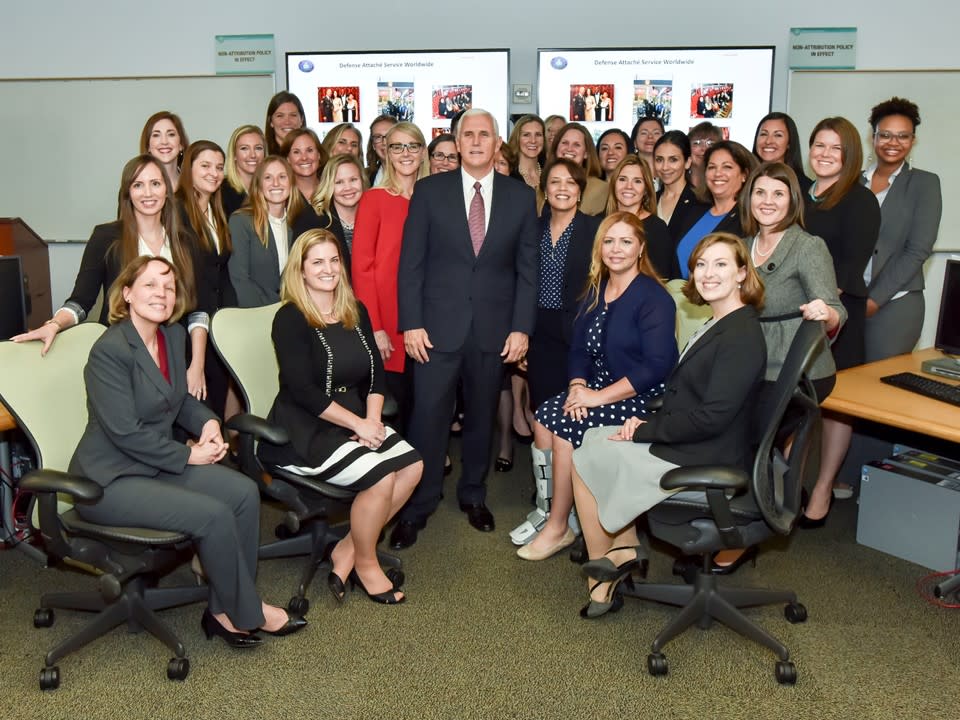Amid North Korea fears, Pence tours U.S. intelligence agencies

As the tense confrontation with North Korea has escalated over the past four months, Vice President Mike Pence has visited four different U.S. intelligence agencies, the nation’s top counterterrorism coordination body, and the North Dakota Air Force base that houses Minuteman missiles and B-52 bombers.
Pence went to the Defense Intelligence Agency on Nov. 6, the Central Intelligence Agency on Nov. 1, Minot Air Force Base on Oct. 27, the National Reconnaissance Office on Sept. 29, the National Geospatial-Intelligence Agency on Sept. 13, and the National Counterterrorism Center on Aug. 24. He has also visited or met with Director of National Intelligence Dan Coats on several occasions, according to knowledgeable sources.
Based on a review of Pence’s public schedule, it appears that he has visited these kinds of agencies more in the past four months than he did in the preceding seven — reflecting the mounting sense of alarm inside the administration about the Stalinist Asian regime in Pyongyang.
A knowledgeable source said Pence’s briefings at the various agencies centered on North Korea and the campaign against ISIS.
There’s nothing particularly unusual about the visits — vice presidents sometimes attend the president’s daily intelligence briefings and visit relevant agencies. Pence has played a central role in the administration’s foreign policy, including trips to Europe and Asia and an upcoming swing through the Middle East.
And the Trump administration faces an array of national security challenges — including North Korea’s ballistic missile and nuclear programs, Russia’s continued occupation of parts of Ukraine, Syria’s civil war, the collapse of Venezuela’s economy, and China’s efforts to control parts of the South China Sea over the objections of its neighbors and U.S. allies.
Briefed at @CIA by top officials. Thanked the men & women of the CIA for their service in defending the U.S people & our freedoms every day. pic.twitter.com/yaNdXcsqSy
— Vice President Mike Pence (@VP) November 2, 2017
Most of Pence’s outreach has been noted on his public schedule, but closed to the news media. At times, the vice president has tweeted about his visits, saying that he thanked CIA officers for their service, or praised the “hardworking” staff at the National Geospatial-Intelligence Agency, and posted photos.
Briefed by Dir. Dan Coats & Dir. Robert Cardillo earlier @ Nat’l Geospatial-Intelligence Agency & met w/ hardworking staff serving US people pic.twitter.com/1KqrCV087i
— Vice President Mike Pence (@VP) September 13, 2017
In a speech at Minot Air Force Base, Pence directly mentioned the standoff with the secretive regime of Kim Jong Un.
“In the face of ongoing threats and provocations by the regime in North Korea, I can assure you the United States will continue to marshal economic and diplomatic pressure to demand that North Korea abandon its nuclear and ballistic missile programs,” Pence said, warning that “all options are on the table.”
At the CIA, Pence told officials that he and President Trump had “the utmost confidence in all of you … because you are America’s elite, and your best is unbeatable by anyone, at any time,” according to the Washington Examiner, which cited prepared remarks not made public by the White House.
That made his visit sound, at least in part, like a corrective to Trump’s frequent disparagement of American intelligence agencies — like his very public skepticism of their finding that Russia meddled in the 2016 election, or his mocking reference to the botched case for war in Iraq, or his pre-inauguration comparison of American spies and “Nazi Germany.”
“The Trump Administration is fully committed to the success of the U.S.’s intelligence capabilities that are uniquely suited to respond to the changing world we live in,” Pence’s press secretary, Alyssa Farah, told Yahoo News.
“The Vice President is committed to doing all he can to support President Trump’s efforts to keep the homeland safe from threats both foreign and domestic,” Farah said by email. “Everyday across the world, U.S. intelligence officials work to undermine our adversaries’ capabilities, combat their propaganda, and prevent acts of terror that endanger our citizens.”
While Pence’s Nov. 6 visit to the DIA was closed to the media, the agency’s in-house public affairs division provided considerable detail in a post on its official website.

“The vice president received classified all-source intelligence briefings on foreign military capabilities from a diverse array of subject matter experts that included specialists in human intelligence (HUMINT), satellite and imagery collection, space/counterspace operations, and clandestine operations,” it said. “He also met with students in several of the agency’s training programs, including analytic tradecraft training and a course focused on the agency’s Defense Attaché program.”
Pence praised the “vital role” DIA analysts play and underlined that “as analysts, your job is not to advocate, but to present facts.”
Read more from Yahoo News:



